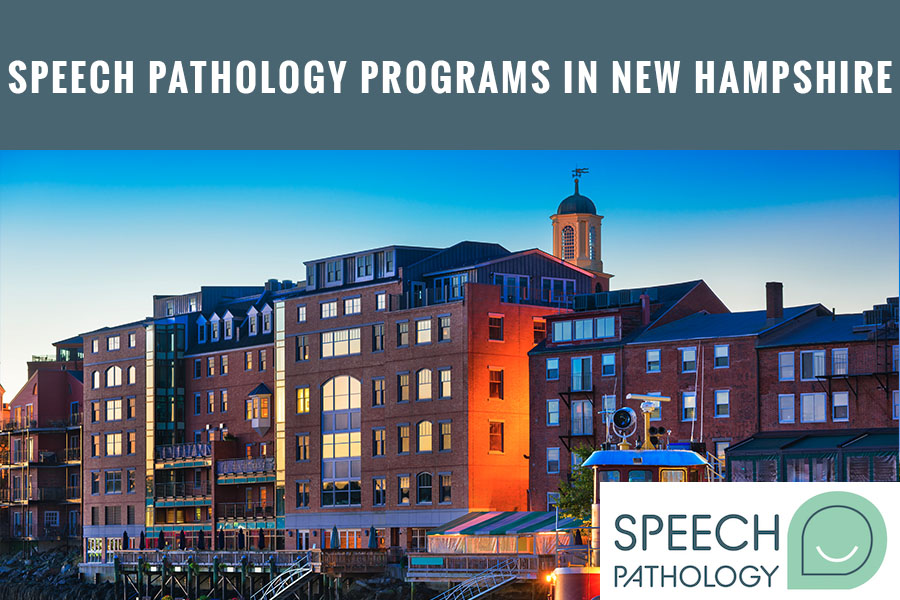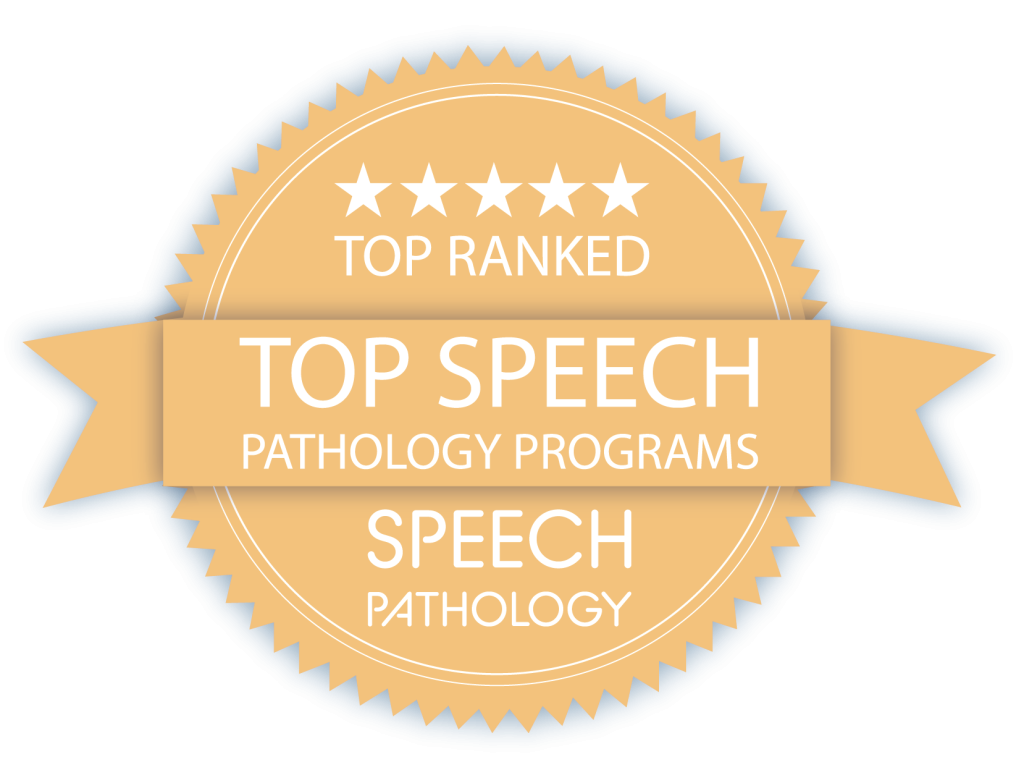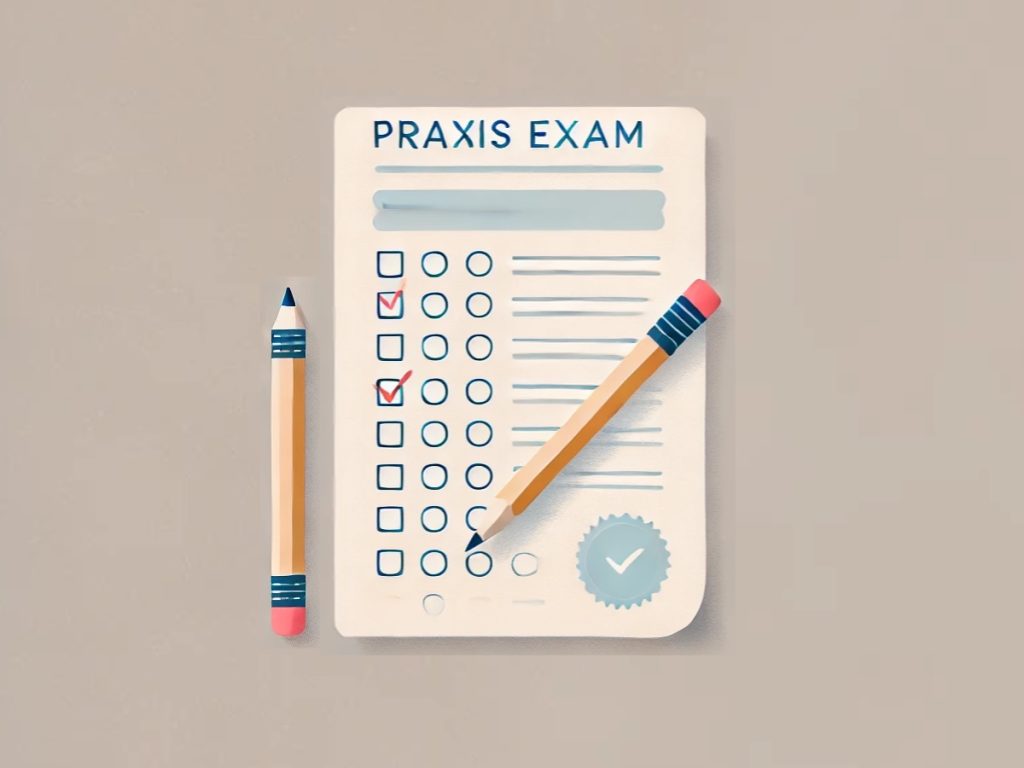Last Updated
April 14, 2025Written By
Cynthia Harris, M.S., CCC‑SLPNew Hampshire is a very attractive state for aspiring speech language pathologists; it has strong job opportunities, good salaries, and good educational programs. Any one contemplating the study or exercise of the profession in New Hampshire can expect a good career outlook. The state has a strong speech pathologist demand because of the aging population, the need for more services in healthcare facilities, and the stable need for school speech pathlogists.
In New Hampshire, SLPs have very good salaries, with the average salary being about $83,630 per year. Many experienced professionals earn more than $100,000 per year. The favorable salary outlook combined with high job placement rates that are often greater than 100% within a year of graduation makes New Hampshire a good place to pursue an education and speech-language pathology career.

Find your future in speech pathology by exploring the best degrees in New Hampshire available. Our team at speechpathology.org highlights top-ranked speech-language pathology programs in New Hampshire to help you start or advance your career. Programs are evaluated for academic strength, research, and clinical excellence. Learn more about our process at speechpathology.org/rankings-methology.

Durham, NH - Public 4-Year - unh.edu
Campus Based - Visit Website
The University of New Hampshire-Main Campus offers a Master of Science in Speech-Language Pathology, a program accredited by ASHA, designed to equip students with the knowledge and skills for a successful career in speech-language pathology. This campus-based program emphasizes a blend of academic coursework, research, and extensive clinical training, preparing graduates for professional certification. With a focus on evidence-based practice, students engage in hands-on learning across diverse clinical settings, supported by state-of-the-art facilities and research opportunities. Admission is competitive, requiring a minimum 3.6 GPA, reflecting the program's commitment to excellence. Highlights include ASHA accreditation, comprehensive clinical training, and research laboratory opportunities.
Manchester, NH - Public 4-Year - cps.unh.edu
Campus Based - Visit Website
The University of New Hampshire College of Professional Studies Online provides a Master of Science in Speech-Language Pathology, accredited by the Council on Academic Accreditation. This program is designed for those aiming to excel in clinical roles addressing communication disorders, offering in-depth training in speech and language intervention techniques. Students benefit from a curriculum that prepares them for certification and employment across various settings, including educational institutions, healthcare facilities, and private clinics. The program stands out for its commitment to high educational standards and professional readiness, making it a prime choice for aspiring speech-language pathologists. Highlights include its accreditation, focus on graduate-level education, and comprehensive career preparation.
When deciding between a bachelor’s in speech-language pathology or a master’s degree in speech pathology, the decision really comes down to your person and professional goals. If you are looking to work in a support role or just get your feet wet in the field, the bachelor’s degree offered by the University of New Hampshire (UNH) Durham campus is a good place to start. This degree offers a good starting point in Speech Pathology and prepares students to work in support roles like Speech-Language Pathology Assistants (SLPAs) or to move onto graduate studies.
Admissions for bachelor’s degrees are typically based on a high school diploma, good grades, and standardized test scores. Some of the coursework you will complete in your SLP bachelor’s degree includes linguistics, speech and hearing anatomy, and psychology to give the student a general introduction to the field of CSD.
If you want to practice on your own and become a licensed speech-language pathologist, a master’s degree is a must. The University of New Hampshire has an accredited Master of Science program in Communication Sciences and Disorders with strong clinical training and high Praxis exam pass rates. This is such a competitive program that admission to it often requires the applicant to be a bachelor’s degree holder, to submit strong letters of recommendation, and to show readiness to learn through GPA and in some cases, the GRE.
The master’s program provides rich, real life clinical practice (minimum 400 clinical hours) to enable the students face actual situations in various contexts such as hospitals, rehabilitation centers, schools or private practices. Due to the scarcity of graduate programs in New Hampshire, students value the small classroom sizes and personal attention provided by UNH or the flexibility of an online master’s from Emerson College.
For the aspiring speech language pathology professionals wishing to pursue higher studies in New Hampshire, it is crucial to realize the specific advantages that doctoral programs present. At present, New Hampshire has no in-state doctoral programs in speech pathology: a research oriented PhD or a clinical Doctor of Speech Language Pathology (SLPD). However, for students who want to pursue advanced education, there are attractive options in neighboring states.
A PhD in SLP is a research oriented degree and is suitable for those individuals who want to contribute new knowledge, advance the field through rigorous academic research or who aspire to academic careers. Good academic and research experiences are provided by programs similar to those of the University of Massachusetts Amherst or the University of Connecticut that are located nearby. Applicants typically require a relevant master’s degree, research experience, high academic grades, GRE scores, recommendation letters and a personal statement of intended research. They graduate to become university faculty, researchers or leaders in clinical practice, using research, policy or education to influence the profession.
The SLPD (Doctor of Speech Language Pathology) concentration is more strongly oriented towards clinical practice, professional leadership, and higher level clinical skills. It is for clinical practitioners who wish to progress to management or ownership or further clinical specialization. New Hampshire students interested in this clinical doctorate may turn to regionally convenient programs such as the well known SLPD offered by the MGH Institute of Health Professions in Boston. The SLPD prepares graduates to manage clinical speech pathology programs, mentor other clinicians and promote policy changes in healthcare systems.
Applicants for either doctoral program must hold a master’s degree in speech-language pathology, have CCC-SLP certification from ASHA, professional experience, strong letters of recommendation, and a compelling statement of purpose. Either type of doctoral candidate usually attends part time or in a hybrid format, practicing professionally while attending school. New Hampshire has no such doctoral programs, but the availability of excellent institutions in nearby states makes further education easily accessible.
In New Hampshire, state regulations govern clear licensure requirements for a licensed speech-language pathologist. Licensing guarantees that professionals achieve standard, strict levels of competence and ethical practice, delivering consistent high-quality care across the settings. Full SLP licensure in New Hampshire needs an accredited master’s degree as the minimum educational standard, and this degree must include at least 400 supervised clinical hours.
Furthermore, SLPs must pass the Praxis national certification exam and finish a clinical fellowship of at least 1,260 hours (which tends to take one year). These milestones are then completed, and individuals then apply for licensure from the New Hampshire Speech-Language Pathology Governing Board. Renewed every two years, the license does include a requirement of ongoing professional development, in the form of at least 30 continuing education hours during each renewal period.
Speech-Language Pathology Assistants (SLPAs) in New Hampshire have different licensure standards. SLPAs usually acquire at least an Associate’s degree (similar to the UNH online program), finish practicum hours and maintain a professional development register (CEs are renewed every two years). SLPA’s role is to expand the therapy services and support the licensed speech pathologists and the work is done under their supervision, but SLPAs have a limited scope of practice.
SLP Licensure in New Hampshire is guaranteed for professionals who meet the minimum requirements of competence and who maintain a commitment to further professional development. This commitment to stringent standards preserves New Hampshire’s reputation for quality speech-language services.
For those students who are looking to get into the field of Speech-Language Pathology as soon as possible, New Hampshire has several ways to get through school quickly. The University of New Hampshire has an associate degree in Communication Sciences and Disorders (SLPA track) which is a fast, two year way to become a certified Speech Language Pathology Assistant (SLPA). This online program is perfect for those wanting to enter the field right away to gain practical experience working under the supervision of a licensed SLP.
However, for those individuals who want to practice as a fully licensed speech language pathologist, the normal step is to get a master’s degree after getting a bachelor’s degree. New Hampshire’s primary master’s option—UNH’s M.S. in Communication Sciences and Disorders, is a traditional two year program, but some regionally accessible online SLP programs offer accelerated alternatives. For instance, nearby Boston’s Emerson College offers an accredited online master’s program that can be completed in as few as 20 months. The availability of fast speech pathology options both online and nearby makes for a good option for those wanting to practice professionally more quickly.
| School Name | Highlights | Retention & Grad Rates |
|---|---|---|
| University of New Hampshire-Main Campus |
|
|
| University of New Hampshire College of Professional Studies Online |
|
|
For the study of speech-language pathology, New Hampshire has several affordable SLP degree options, and most of them are state-supported. The cheapest way to do this is through the University of New Hampshire’s online associate degree in Communication Sciences and Disorders (SLPA track), which costs $314 per credit or $18,840 all in all. This program is also a relatively inexpensive way to gain entry into the field, enabling students to work as SLPAs at a relatively low cost.
At the graduate level, in-state tuition at UNH’s Master of Science in Communication Sciences and Disorders is the most affordable option for a future licensed SLP. New Hampshire residents can get the entire two year master’s program for around $29,000 – a huge savings compared to private or out-of-state schools that often cost more than $50,000. In all, New Hampshire’s state-supported programs are quite good value, especially for local residents, thus making it a good and relatively cheap state for students who want to work in speech pathology.
| School Name | Highlights | Annual Estimated Tuition & Fees |
|---|---|---|
| University of New Hampshire-Main Campus |
|
|
| University of New Hampshire College of Professional Studies Online |
|
|

If you are interested in pursuing a career in SLP and have been researching licensing requirements or are simply interested in learning more about SLP

If you have ever been researching speech-language pathology careers and come across the words ‘speech pathologist’ and ‘speech therapist’, you might wonder if they are

If you are pursuing the position of a speech-language pathologist, then you may have heard of the Praxis exam from your professors, classmates, or even
Our mission is to empower future speech-language pathologists by providing the most accurate, up-to-date, and accessible information available. Our team is dedicated to guiding individuals through the journey of becoming an SLP—whether you’re just exploring the field or actively pursuing a degree. We specialize in delivering reliable insights on state-by-state availability, affordability, and the fastest paths to certification and licensure. Our goal is to help you make informed decisions based on real data, trusted resources, and the evolving needs of the profession. With a strong commitment to educational clarity and career transparency, we’re here to support and simplify your path toward a rewarding future in speech-language pathology.
PLEASE NOTE: The contents of this website is for informational purposes only. All trademarks are the property of their respective trademark holders.